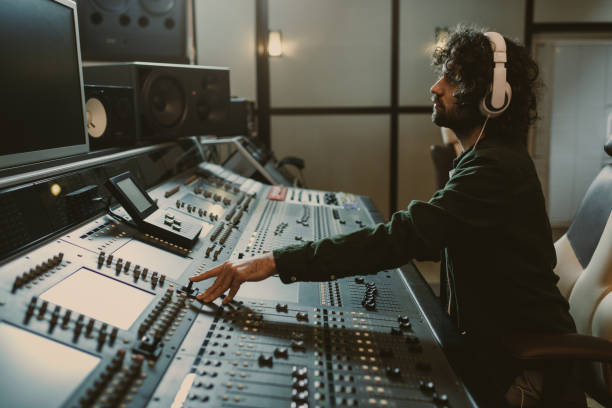Scientists Discover Amazing Benefits of Listening to Music
You’re not alone if you enjoy listening to music. Charles Darwin once said, “If my life were over, I would make a rule that I read poetry and listen music at least once per week.” Jimi Hendrix described music as his “religion.”
I have always been amazed at people who can play the guitar and sing. As a child, I secretly listened in my bedroom to songs by singer-songwriters until the early hours of the morning. I was a rebellious teenager who listened to rock ‘n roll whenever I had chores. It was always a great feeling to come home afterwards.
Research has shown that music can improve our mental health and physical well-being in amazing and surprising ways. Music lessons can increase our intelligence and keep us sharp into old age if we take one or two music lessons. Here are 15 amazing scientifically-proven benefits of being hooked on music.
Music makes you happier.
William James: “I don’t sing because it makes me happy. I sing because it makes me happy.”
Research shows that listening to music can make your brain release dopamine. This is a neurotransmitter that makes you feel good. Valorie Salimpoor from McGill University was a neuroscientist who administered radioactive substances to eight music-lovers after listening to their favourite music. PET scans revealed that dopamine levels were high, which caused participants to experience joy, happiness, and excitement.
Listen to your favourite songs for at least 15 minutes the next time you need an emotional boost. This is all you need to feel a natural high.
Music enhances running performance.
“If people take something from my music it should be motivation to keep working at it, and not back down.” – Eminem
Marcelo Bigliassi and colleagues discovered that runners who listen to fast motivational music run the first 800m faster than those who listen to quiet music or run without music. Listen to music that inspires you if you want to improve your running.
Music can lower stress and improve health.
“Music is healing in its own right. It is a powerful expression of humanity. It is something that touches us all. It doesn’t matter from which culture.” – Billy Joel.
The music you listen to can reduce the stress hormone cortisol in your body. This counteracts the effects of chronic stress. One study found that people who actively participate in creating music, such as playing percussion instruments or singing, have a higher immune system than those who listen passively. This is a significant finding as stress can cause 60% of all illnesses and diseases.
Turn on the radio to stay calm and healthy in stressful situations. Sing along and tap your toes to the beat to get maximum healing benefits.
Music helps you sleep better.
Berthold Auerbach: “Music washes away the dust of every day life.”
More than 30% of Americans are affected by insomnia. Study results showed that students who listened to relaxing classical music 45 minutes before going to bed slept better than those who listened to audiobooks or did nothing different from their usual routine. To get some Zs, listen to some Bach or Mozart before going to bed if you have trouble sleeping.
Music can reduce depression.
“Music was my refuge. Music was my refuge. I could curl up between the notes to drown in loneliness.” – Maya Angelou.
Around the globe, more than 350,000,000 suffer from depression. A staggering 90% suffer from insomnia. The sleep research above showed that depression symptoms decreased in listening to classical music before bedtime. This was in contrast to the results of the two other groups. Hans Joachim Trappe, a German researcher, also found that music can help with depression depending on what type of music is being played. People felt lifted by classical music and meditative sounds, while techno and heavy metal made them feel worse.
Listen to some classical or meditative tunes to lift your spirits the next time you feel down.
Music Helps You Eat Less
“Music and eating area in a friendly relationship.” – Thomas Hardy
Georgia Tech University research showed that people who soften the music and lighting while they eat eat eat fewer calories and enjoy their food more. You can curb your appetite by dimming the lights or listening to soft music the next time you eat.
Music can lift your mood while driving.
“That’s all I love. I love being alone in my car listening to the rain in the rain, without being interrupted. Alison Kraus: “There are many great songs still to sing.”
A Dutch study found that music can positively affect your mood while driving. This can make it safer than not listening to music. Turn up the music next time you feel frustrated while driving. It won’t affect your driving performance, but it might help you drive safer.
Music strengthens learning and Memory.
Jodi Picoult: “Music is the language that memories are spoken in.”
Researchers found that music could help you remember and learn information. However, it all depends on your musical taste and whether you are a musician. While listening to either positive or neutral music, subjects were able to memorize Japanese characters. The results showed that non-musicians learned better from positive music but did better with neutral music. Musicians performed better with neutral music but did better when they heard pleasurable music.
These results should be kept in your mind. Now you have a strategy for studying more effectively for the next test.
Music helps patients relax before/after surgery.
Miguel de Cervantes: “He who sings scares away all his woes.”
Research has shown that relaxing music can reduce anxiety. It’s more effective than Midazolam orally administered, which can cause nausea and coughing in pre-op patients. Another study showed that relaxing in bed with soothing music after open-heart surgery results in relaxation.
Worldwide, 234,000,000 major surgeries take place each year. You can bring soothing music to help ease your anxiety if you have surgery. This may be more effective than the medication they give and have fewer side effects.
Music can reduce pain.
Bob Marley: “One of the best things about music is that it hits you and you feel no pain.”
Drexel University in Philadelphia discovered that music therapy, pre-recorded, and radiotherapy reduced pain significantly more than standard treatment for cancer patients. Another study showed that music could reduce pain in patients receiving intensive care and senior care. However, the music selection must be either classical music, meditative or songs were chosen by the patient.
Bob Marley was correct about this one. Listen to the music that you love to ease your pain.
Music helps Alzheimer’s patients remember.
“The past is irrecoverable. It is embedded in music. People can regain their identity.” – Oliver Sacks M.D.
Music & Memory is a non-profit that helps people with Alzheimer’s Disease or other age-related dementias to remember who they are. They listen to the songs that matter most. Sometimes, the awakening can be dramatic. Henry, a dementia patient who used a wheelchair, listens to music from his age and sings Cab Calloway songs, reminiscing about his past.
Dr Laura Mosqueda is the Director of Geriatrics, University of California Irvine School of Medicine. She explains that music has a wide range of effects on the brain. This stimulates pathways that could still be healthy.
One-third of seniors will die from Alzheimer’s Disease or another form of dementia. Playing their most beloved music can help you connect with your loved ones suffering from dementia.
Music improves stroke recovery.
“I know why the caged birds sing.” – Maya Angelou.
The University of Helsinki found that stroke patients who listened for two hours to music they selected themselves had significantly better recovery of cognitive function than those who listened only to audiobooks or received no listening material. The majority of the music had lyrics. This suggests that the combination of music with voice boosted patients’ verbal and auditory Memory.
Stroke is the 5th leading cause of death. You can help speed up the recovery process by listening to their favourite songs. Send your favourite songs to someone you care about who has had a stroke.
Music increases verbal intelligence.
“Music is to your soul what words are for the mind.” – Modest Mouse.
A York University study found that 90% of children aged 4-6 had a significant increase in their verbal intelligence after just one month of music lessons. The lesson included rhythm, pitch and voice. Sylvain Moreno, a researcher, suggests that music training has a “transfer effect” that enhances children’s ability to understand words and meanings. Another study found that verbal memory tests showed that children with musical training outperformed those who did not.
Music lessons can help you improve your vocabulary, whether you are an adult or a child.
Music can increase academic performance and IQ
“Music can change the whole world because it can also change people,” – Bono.
Research has shown that music lessons can predict higher academic performance and IQ among young children. One study found that 6-year-olds who had taken piano or singing lessons for 36 weeks experienced significantly higher IQ and standardized educational tests results than those who did not take lessons. The singing group performed the best.
Please encourage your children to learn how to play or sing an instrument to help them achieve academic excellence.
Music keeps your brain healthy in old age.
Music is the true life force. We eat so that we don’t starve. We sing to hear ourselves live.” Yasmina Khadra
Studying healthy older adults, it was found that people with ten years or more of musical experience scored higher in cognitive tests than those who have only one to nine years of musical education. Non-musicians scored the lowest. Brenda Hanna-Pladdy, the lead researcher, says that studying an instrument takes years of practice and learning. This may cause alternate brain connections that could compensate for cognitive declines with age.
Warren Buffet is a business magnate who still plays the ukulele at age 84. You don’t have to be old to learn an instrument.
Plato was right when he stated that music and rhythm “find their way into secret places of the heart.” It can reduce stress and anxiety. It can also lift your mood, improve your health, help you sleep better, relieve your pain, and even make you smarter.
Recent research has shown that music can communicate basic human emotions regardless of the listener’s ethnicity or cultural background. We are just beginning to grasp all the benefits this universal language could bring to the world. Instead of cutting funding for music and art programs at schools, why don’t we invest in discovering all the hidden places music can reach so that we may continue to reap its incredible benefits?














Post Comment